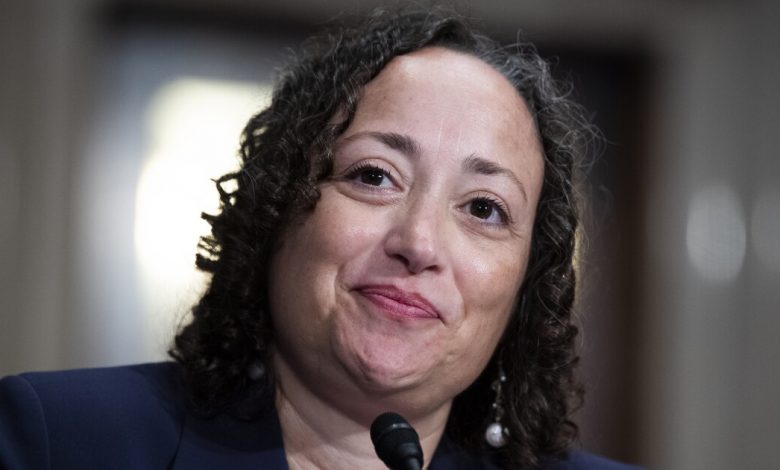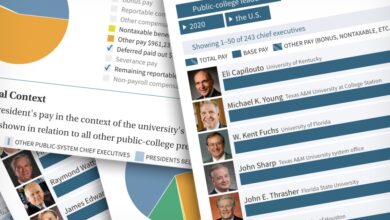Here’s How Title IX Could Change Under Biden’s Proposed Rule

[ad_1]
The U.S. Education Department on Thursday released its proposed Title IX regulations, which would reverse many Trump-era policies and restore the pro-victim approach championed by the Obama administration.
Specifically, the rule would:
- Enshrine protections for sexual orientation and gender identity, as well as “sex stereotypes, sex characteristics, [and] pregnancy or related conditions.”
- Permit, but no longer require, live hearings and cross examination in Title IX investigations.
- Expand the definition of sexual harassment.
- Clarify the protections students, faculty, and staff have from retaliation by their institution.
- Require colleges to confront off-campus conduct that “creates or contributes to a hostile environment.”
- Require certain staff members to notify the Title IX office of possible sex discrimination — a return to broader mandatory-reporting requirements.
The changes would once again upend how colleges handle sexual-misconduct complaints. Experts who work with colleges say campus officials are exhausted by more than a decade of political Ping-Pong over Title IX, as the three most-recent presidential administrations have switched up rules and guidance, and colleges have rushed to comply.
Shortly after taking office in 2021, President Biden issued an executive order directing Secretary of Education Miguel Cardona to review the Trump administration’s Title IX rule, issue new guidance, and consider regulatory changes. The move was expected, as Biden made awareness and prevention of campus sexual assault a priority when he was vice president.
The Biden administration’s proposals were supposed to be released in April, but were delayed. A 60-day public comment period, through the Federal Register, begins immediately. After considering the feedback, the department will release its final rule, which carries the force of law. When the previous administration proposed its Title IX regulations, in 2018, the department received more than 100,000 comments.
Title IX, which bans sex-based discrimination in educational settings, has been in effect since 1972, but was primarily known as a sports law until recently. In 2011, the Obama administration issued guidance spelling out colleges’ obligations to respond to sexual violence under Title IX. The guidance, known as the “Dear Colleague” letter, directed colleges to take sexual assault more seriously or risk being investigated by the Education Department’s Office for Civil Rights.
If colleges are found in violation of Title IX, they can lose their federal funding. (The civil-rights office has never levied that penalty.) Institutions scrambled to follow the directives; many colleges created Title IX offices and hired new staff members.
But concern grew that some students accused of misconduct were being punished based on murky allegations and not given a meaningful chance to defend themselves. Under former Education Secretary Betsy DeVos, the Trump administration codified protections for accused students, drawing praise from due-process advocates and criticism from victims’-rights groups.
Now, the pendulum has swung back. Let’s take a closer look at what the Biden administration’s proposed rule would change.
Add protections for LGBTQ+ students.
For the first time, the proposed regulations would formalize protections for sexual orientation and gender identity under Title IX. But the Education Department punted on the question of transgender students’ participation in athletics, saying officials would propose a separate rule in the future.
The Biden administration has interpreted Title IX as prohibiting discrimination based on these characteristics, but that interpretation hasn’t previously been codified.
In 2017, Trump’s Education Department threw out an Obama-era directive that sought to protect transgender students’ rights under Title IX.
Kenyora Parham, executive director of End Rape on Campus, an advocacy group for sexual-assault survivors on campus, said transgender students are disproportionately affected by campus sexual misconduct. Data bears this out. Trans students also suffer higher rates of anxiety, depression, and suicidal ideation compared with their cisgender peers, research shows.
Parham said she’s hoping the new rule “clarifies and establishes that fact that transgender students also have rights.”
End cross-examination and live-hearing requirements.
Biden’s proposed regulations would slash key hallmarks of DeVos’s policy from the regulations, including cross-examination and live-hearing requirements.
Under the DeVos rule, colleges must hold live hearings as part of formal Title IX investigations and allow advisers for each student to cross-examine the other side. Victim-advocacy groups have opposed these requirements, saying such procedures can be traumatic for victims of sexual misconduct.
Title IX experts have cited another problem for colleges: that even if a student admitted to committing sexual assault, a campus hearing panel couldn’t actually consider that testimony if the student refused to participate in the hearing. In August 2021, after a federal district court in Massachusetts ruled that the prohibition was “arbitrary and capricious,” the department’s Office for Civil Rights announced it would not enforce the cross-examination requirement; it left the live-hearings requirement untouched.
Some colleges, like the University of Michigan at Ann Arbor, would still have to preserve live hearings and cross examination in Title IX cases because of recent appeals-court rulings.
Adopt a broader definition for sexual harassment.
The Biden rule proposes widening the scope of behavior that’s considered harassment under Title IX to “all forms of sex-based harassment, including unwelcome sex-based conduct that creates a hostile environment by denying or limiting a person’s ability to participate in or benefit from a school’s education program or activity.”
The shift would increase the number of cases that colleges would be legally obligated to investigate, although many campus officials say they’ve continued to investigate all reported misconduct even under the stricter definition in the DeVos regulations.
Under DeVos, the definition of sexual harassment was changed from “unwelcome conduct of a sexual nature” to behavior that is “severe, pervasive, and objectively offensive.” Critics of the narrower meaning argue that it deters victims from reporting sexual harassment.
“With that narrow of a definition, it essentially is saying that a student has to endure repeated levels of violence before their school essentially takes on their case,” Parham, from End Rape on Campus, said.
Even though many due-process advocates support narrowing what behavior rises to the level of harassment under Title IX, they also argue that the way the current regulations are written allows colleges to use “parallel justice systems” for adjudicating sexual-harassment cases — where one system doesn’t meet the stringent standards for Title IX.
And that means students are not provided “some of the due-process protections that you would see in the Title IX types of regimes,” says Kimberly Lau, a Title IX lawyer and due-process advocate.
Jeffrey Nolan, a Title IX lawyer who works with colleges, said the extent to which the alternative sexual-misconduct policies parallel the Title IX sexual-misconduct policies depends on the institution.
“Some schools use the same procedure for everything because it’s administratively efficient and ensures that you’re not going to have a battle with parties who say you’re not doing enough procedurally,” Nolan said. “Other schools say, we don’t think it’s necessary for fairness to have a live hearing with cross [examination] run by advisers.”
But it has been a nightmare for colleges to explain the dual processes to students, Nolan said: “You’ve got 80 pages of stuff in flowcharts and it’s just unnecessarily complex.”
What’s next?
It’s hard to estimate how long it will take before the proposed rule is finalized. DeVos released her proposed regulations in 2018, but they didn’t become law until 2020.
In May 2020, when the final Title IX regulations dropped, colleges were given only a few months to get in compliance before the regulations took effect.
Phil Catanzano, who teaches higher education and the law at Harvard Law School and spent almost a decade at the Office for Civil Rights, said he hopes colleges are granted more time to get up to speed this time around.
In 2020, “a lot of schools were racing to try to figure out what was the best process — ‘How do we do this as quickly as possible and also maintain the things that we want to do as part of our institutional philosophy?’” Catanzano said. “And that was really hard.”
Another outstanding question is what federal enforcement of Title IX will look like — and whether Catherine E. Lhamon, the assistant secretary for civil rights, will go on offense and put dozens of colleges under investigation, as she did during her previous stint leading the civil-rights office under the Obama administration.
But several Title IX experts also told The Chronicle that it’ll be easier for colleges to adapt to more flexible regulations, as opposed to the strict guardrails that were put in place during the last administration.
Courtney Bullard, a higher-education lawyer and expert on Title IX compliance, said that when institutions are scrambling to keep up with an ever-shifting political climate, “It’s really hard to get back down to what’s really important — which is trying to prevent these things from happening and then doing a really good job in responding to and addressing them when they do.”
[ad_2]
Source link






